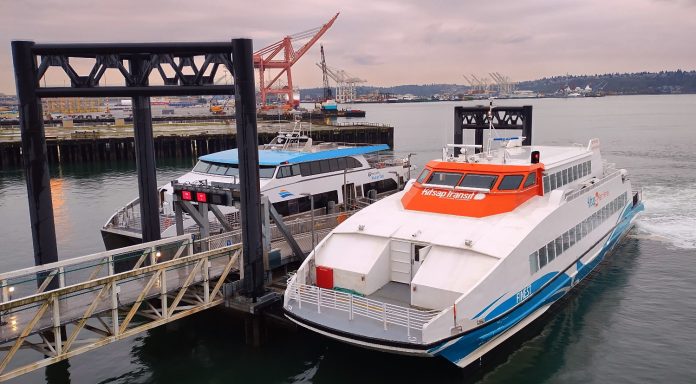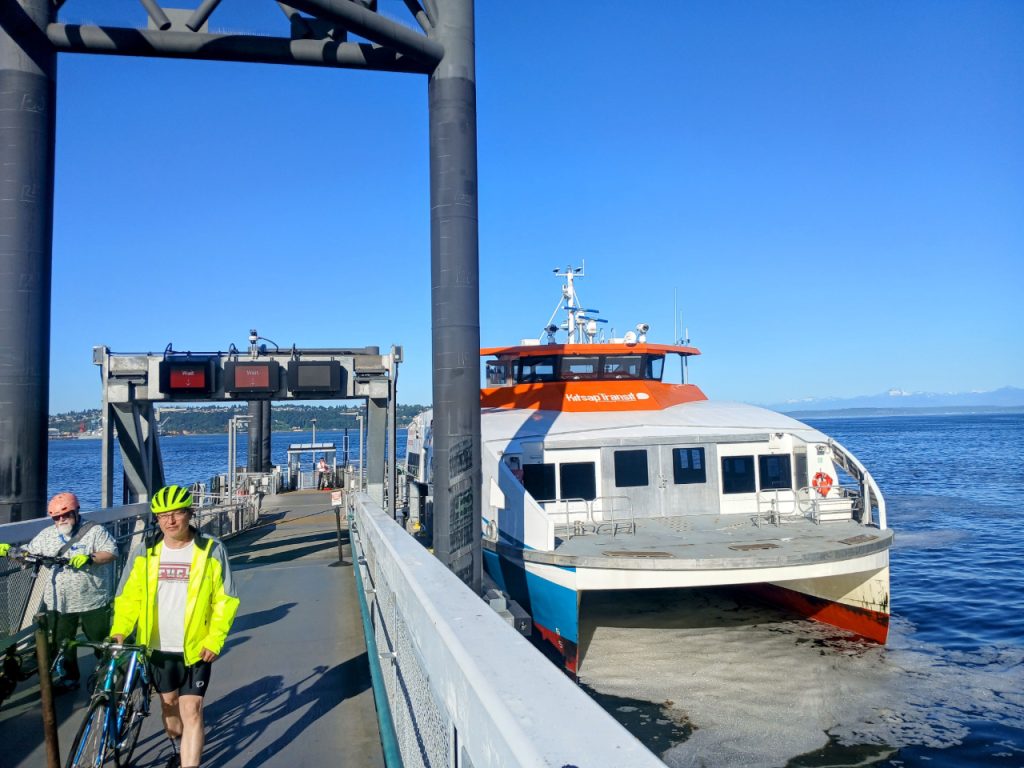
This week, King County announced that extra mid-day water taxi trips on weekdays, providing Vashon Island residents and visitors extra mobility options that have become well-utilized. Extra state funding first made those trips possible in 2024, and the state legislature opted to continue funding them — at least through 2027 — during the recent spring session.
While the near-term future of passenger ferry service levels to and from Downtown Seattle is becoming clearer, the future of additional Kitsap Transit fast ferry service to Bremerton that many Puget Sound residents have come to depend on is more murky. That extra foot ferry service was intended to make up for WSF reductions, and quickly became popular.
This summer, Washington State Ferries (WSF) is restoring service to both Bremerton and Vashon Island to pre-pandemic service levels for the first time since 2020. Seattle-Bremerton service has already seen two-boat service restored, with three-boat service returning to Fauntleroy-Vashon-Southworth by June 30.
But many local residents had been hoping to see the extra passenger-only ferry service stick around to continue to provide a backup option for ferry-dependent communities.
That wish has been granted for Vashon Islanders. King County is set to spend around $2.5 million per year to keep four round trips in place between Vashon Island and Downtown Seattle’s Pier 50 through summer of 2027. The state’s overall allocation to the county was $10 million in all.
This spring, usage of the Vashon water taxi has climbed to nearly 600 daily riders, approximately double the number of riders seen two years prior. The 10 total daily round trips directly to downtown cut travel times considerably compared to riders who would otherwise have to head through West Seattle.
“Midday water taxi service has been a lifeline for the Vashon community over the last year, providing reliable connections to healthcare, employment and local businesses,” King County Councilmember Teresa Mosqueda said in response to this week’s news.
Mosqueda was an outspoken advocate for additional service to Vashon in 2024, and hailed the program as a success.
“Ridership numbers and feedback I’ve received from islanders underscore the success of adding these trips to mitigate reduced Washington State Ferries service,” Mosqueda said. “I’m thrilled that we will be able to continue this service that is so vital to Vashon’s public health and local economy. A huge thanks to the Vashon community for their advocacy and to our state legislative partners, led by Senator Emily Alvarado, for their partnership.”
Meanwhile, nearly 2,000 daily riders hopped on the Bremerton fast ferry over the same time period, given the higher number of trips that Kitsap Transit offers and the larger population center that is serves.
Why is the future of Bremerton fast ferry service in limbo? Kitsap Transit and King County are currently in negotiations with WSF over a separate pot of $4 million also intended for passenger ferry service. Until those negotiations conclude, it’s not known exactly how many additional trips Kitsap Transit will be able to operate on its Bremerton-Seattle route through the off-season, including whether the agency offers any trips on Saturdays.

Currently, the Bremerton Fast Ferry operates 20 round-trips weekdays through the summer, of which seven are funded by the Washington Department of Transportation (WSDOT), and 10 round-trips on Saturdays, all of which are funded by Kitsap Transit. During the winter schedule — October through April — WSDOT funding allows the agency to operate seven round-trips on Saturdays, along with those additional seven weekday trips. The extra trips have been made possible with $5 million allocated for the 2023-2025 biennium, which ends June 30.
“We understand that WSDOT was appropriated $4 million to temporarily supplement passenger-only ferry service by Kitsap Transit and King County Water Taxi, and that Washington State Ferries (WSF) will determine the most effective way to use these funds,” Kitsap Transit spokesperson Sanjay Bhatt told The Urbanist. “We will notify our customers when we have clarity on the outcome and how that impacts our Bremerton Fast Ferry schedule after June 30.”
The entire $4 million likely wouldn’t be enough to sustain all of the supplemental trips for two years, but that funding could represent a bridge to maintain them through next year’s transportation budget. However, it’s clear that many legislators see the extra Kitsap fast ferry trips as superfluous given the return of two-boat service to Colman Dock.
Earlier this year, when Representative Greg Nance (D-23rd, Bainbridge Island) helped to secure a one-time $3.5 million for Kitsap Transit in the House transportation budget, that funding didn’t survive reconciliation with the Senate’s budget. Senate transportation committee chair Marko Liias (D-21st, Edmonds) told reporters that the supplemental service was “always intended to sort of be a stop gap,” and that WSF investments were a higher priority. The Senate also failed to support Nance’s Mosquito Fleet Act, a bill that was intended to make it easier for local governments to set up passenger ferry districts.
While WSF’s service restorations are a big step forward, things still remain precarious. After restoring boats to this summer’s routes, the department will be operating 18 out of its 21 boats, with limited ability to sub in replacement vessels when repairs are needed. WSF’s contingency plan spells out which routes would see reduced service first when vessels aren’t available: Vashon, followed by Bremerton, followed by Port Townsend-Coupeville. The department clearly isn’t in a place where backup options like fast ferries are never going to be needed, apart from the direct benefits those fast ferries offer.
While mobility advocates in Vashon Island are celebrating the extension of fast ferry trips for a few more years, at least, Kitsap County ferry riders are still holding their breath.
Ryan Packer has been writing for The Urbanist since 2015, and currently reports full-time as Contributing Editor. Their beats are transportation, land use, public space, traffic safety, and obscure community meetings. Packer has also reported for other regional outlets including BikePortland, Seattle Met, and PubliCola. They live in the Capitol Hill neighborhood of Seattle.

